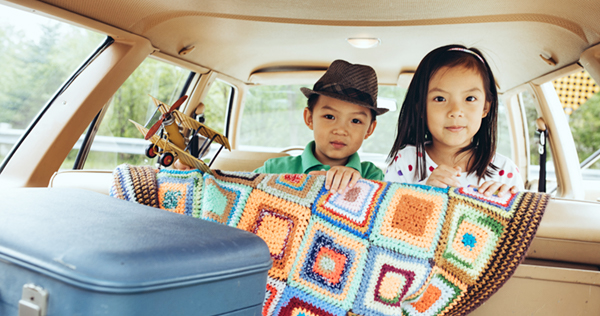By Jackie Sage, LMFT, Child, Adolescent, and Family Therapist
Family road trips can be a great way to create life-long memories. Planning for those more challenging times of your trip, however, is just as important as packing your toothbrush. No matter how old the kids (or you and your partner!), an extended period of time in a small, enclosed space can be a hotbed for emotions.
Below are some suggestions for getting the most out of your time together.
-
Set Expectations Before you Go
Before you leave, schedule a family meeting to establish some rules and expectations for the trip. Discussing or illustrating your trip schedule can set the pace and expectations as well. Let your kids come up with some of the rules and the consequences as age-appropriate, with parents having the final word. Bring a piece a paper to write everything down, then tape the paper to the back seat for easy access and reference. If the kids are too young to read, draw it out. You can strategically add rules you know will arise with your family by including items like “keep your hands, feet and bodies to yourselves or on your side unless you ask permission first.”
-
Have New Discussions
At some point on the road trip, if everyone is calm, you can hold a family discussion about a topic that is not emotionally charged for anyone in the car. For example, my family has mentioned designing a family crest, so this would be a fun time to brainstorm ideas which could represent all of us. A fun discussion can pass the time quickly, as long as it doesn’t rile anyone up.
-
Lighten Things Up with Family Games
When you take time to discuss family matters or deeper topics, tension may build. Lighten it up with a family game. Some verbal games can be played with the whole car, such as I Spy or Out-of-State License Plates. Some games are great for backseat participants, such as dice games or card games.

-
Be Prepared for Conflict
It’s human nature to push each other’s buttons. particularly in enclosed
spaces. It’s important to be clear up front that certain behaviors will not be tolerated and there will be “natural consequences” that will follow if they arise. Keep in mind, however, that some conflict is normal and expected and try to be compassionate when people inevitably rub one another the wrong way. As we all can probably attest, no one can get under your skin quite like a family member.
Try speaking calmly even in the face of high emotion, and listening calmly to what everyone has to say.
-
Remember that Every Moment Needn’t be a Bonding Moment
If none of the above works, some distraction or alone time can reset the
mood. This is useful at any age. After all, most of us need to take a step back to recalibrate before we move forward. This can include anything that your family needs to peacefully recharge. Nap, read a book, take a walk, look at the stars, watch a movie, play a video game, or go on social media. Don’t get anxious about taking a trip to bond and then not ‘taking advantage’ of every moment together. Everyone needs some “me” time, and finding the proper balance for your family could be the key to your best vacation yet.
-
Have Fun Mixing it Up
Do what feels right in the moment. Sometimes a break or change in plan is needed before you proceed with your itinerary. Your carefully laid plans for the trip may be great, but they can also hold you back from living in the moment and seeing where your adventure takes you and your family.
Happy traveling!
Seeking resources to help your child thrive? Attend a workshop, schedule a parent education meeting, or schedule an assessment with one of the Child and Adolescent Specialists at Parents Place.
Jackie Sage, LMFT, is a licensed Marriage and Family Therapist who has worked with children, teens, and families providing psychotherapy and coaching. Her areas of expertise include self-esteem, anxiety, depression, anger, and family transitions. Jackie earned a BS from the University of Wisconsin—Madison, and has a Masters in Counseling Psychology from JFK University.



